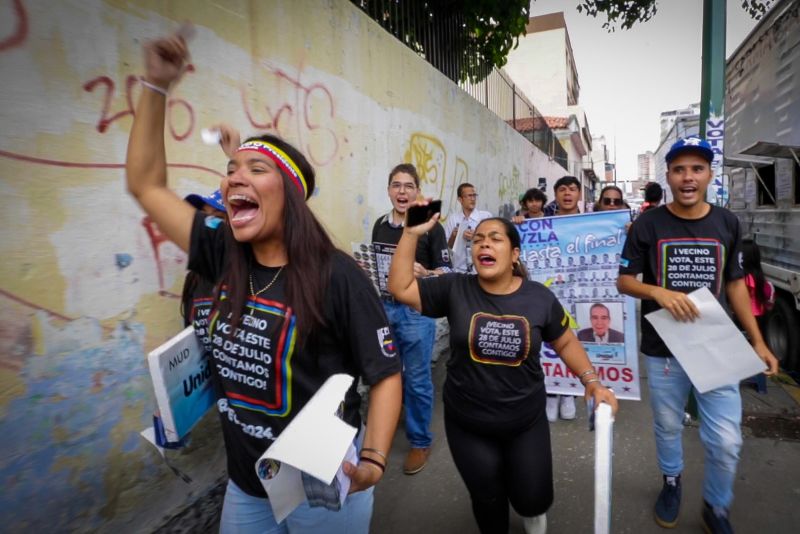
Young Venezuelan opposition voters prepare to leave the country if Maduro is reelected
Ambar Leáñez grows quiet when she thinks of a future beyond this weekend.
A staunch supporter of Venezuela’s opposition movement, she’s buoyant about her coalition’s chances to win this Sunday’s presidential election. The thought of another six years under the incumbent – Venezuela’s entrenched authoritarian president Nicolás Maduro – would drive her to flee the country, she says.
Often divided among its many political parties, Venezuela’s anti-government coalition has united behind a single presidential candidate, Edmundo González.
Many experts believe that González could pose Maduro’s toughest political challenge to date. On top of a galvanized opposition, pressure from the international community and Venezuela’s oil sector have led to a series of agreements that paved the way to a competitive election this year.
On Friday, members of a young opposition group in Maracay, a mid-size city in central Venezuela, took to the streets with fliers and slogans to galvanize votes for González. A few years ago, openly calling for Maduro’s removal here could have invited trouble.
But the group, called “Neighbors for Venezuela,” campaigned without incident. Leañez among them shouting anti-Maduro slogans in the city’s market: “Urgent, we need a new president!”
Another protester, Julio César Pérez, described the choice looming on Sunday in stark terms: “For me, it’s change or the Darién.”
Campaigning with your bags ready
Thousands of Venezuelans have already trekked through jungles and rivers in the Darién Gap between Colombia and Panamá to head northward toward the United States.
If Maduro remains in power, experts predict that millions more may follow. One poll conducted in June by Venezuelan firm ODH Consultores, estimates up to a third of the population is considering leaving the country after the election.
“I don’t want to leave!” has become a popular chant among opposition supporters.
Most people in Venezuela know someone who has emigrated already. Large numbers of Venezuelans now live in Colombia, Perú, and Brazil, and growing numbers have attempted relocating to the United States – part of a significant election year issue for American voters.
Leáñez’s uncle, Rafael Cabrera, moved to Miami in 2021. On a videocall to his niece in Maracay, he expressed anger that he would not be able to vote on Sunday – Venezuelans living abroad are not allowed to vote by mail, and Venezuela doesn’t have consular representation in the US, which means there are no paths to the vote for Cabrera.
To join him one day, Leáñez said she would consider migrating as an undocumented migrant. “I would wish to migrate as legally as possible, but it’s is one of the cards in my hand. An option… What else could I do?” she said.
‘To all Venezuelans abroad…come home!’
On the campaign trail, both Venezuela’s current government and the opposition are urging Venezuelans abroad to return.
Since 2018, a government-sponsored “Return to the Homeland” program organized free flights for more than 10.000 Venezuelan migrants who wished to come back from other Latin American countries.
“We have gone through a bad stretch, really bad, but we’re getting better, we’re improving… to all Venezuelans abroad […] come home!” Maduro said last month.
It’s an issue that has touched the top leaders of the opposition movement personally – though they have chosen to stay and fight, in a battle for Venezuela’s future that will be decided on Sunday.
Opposition leader María Corina Machado, who has campaigned alongside González after being barred from running as a candidate, has endured a familiar separation, with her three adult children and their families all living abroad.
